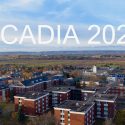Acadia University has recently launched Acadia 2025, a strategic planning exercise for the year 2025. On Thursday, the Task Force of Acadia 2025 held an open drop-in session in the SUB for the student body to share their views regarding the project. This comes following the release of the Acadia 2025 Ideabook last month.
The Ideabook summarized the feedback received from students, faculty and staff from surveys conducted in mid-March and June of last year. The strategic plan will address four basic areas as indicated by the survey responses. These four areas being: Campus Infrastructure and Facilities, Academics, Organization and Community.
On the list for campus infrastructure and facilities is improvements and renovations to many of the central structures on campus, including the Vaughan Memorial Library, the Student Union Building and the Athletic Complex. On-campus residences have been identified as needing updating, as well as modernizing classroom and lecture spaces. There are also plans to make the entire campus physically accessible, in line with Nova Scotia’s new accessibility legislation that went into effect last April.
In terms of academics, Paul Callaghan, director of the Acadia 2025 Task Force, underlined the importance of maintaining relevancy in the education programs offered at Acadia. He pointed out that programs such as the Environmental and Sustainability Studies is an example of keeping up with current global trends, and to ensure graduates from Acadia are prepared to face 21st century issues. With this goal in mind, Acadia would like to expand the programs offered with a special focus on interdisciplinary studies.
A program for students wanting to complete both a BA as well as a BSc has been discussed, as well as the possibility of a liberal arts foundation year. The importance of extracurricular experiences has been identified as setting apart graduates who partake in them. Being thus, plans to expand and in appropriate cases, make mandatory, the participation in co-op or study abroad programs are also being considered. As Callaghan emphasized, Acadia “has a duty to uphold our reputation” especially when it comes to academics.
The third main pillar of the plan is concerned with organization. From the survey responses, it became clear that the administrative and technology systems currently in place are no longer keeping up to the needs of students, faculty and staff. The plans for 2025 involve re-organization of these systems to improve efficiency, with the proposed idea of condensing locations of all the academic and financial administration buildings to make a ‘one stop shop’ for students. Academic flexibility was also identified in the responses as needing improvement, such as making it easier to transfer credits or switch programs.
High on the list is the need for an improved IT platform, identified as critical for administrative purposes especially. There is also plans to address Acadia’s historic challenge with recruitment and retention. According to Callaghan, this challenge relates back to relevancy, as he states that “we must be able to attract students from all over Canada with programs that are relevant”. Acadia does not want to compete with larger institutions, but rather use the unique experience Acadia has to offer to attract students instead.
The fourth pillar is concerned with building and maintaining more relationships with the community we are fortunate enough to live in. More partnerships with community organizations for research opportunities have been identified, as well as a starting an Indigenous Pathways program to further support students who identify as as Indigenous. To broaden community connections, and to potentially aid in recruitment, a program that exposes high school students to university has been proposed. This would allow high school students to experience university living for a week, living on campus and taking some classes to gain a better insight into what Acadia has to offer.
While still in the idea stage, a Task Force consisting of fifteen dedicated representatives of faculty, staff and students has been assembled with the goal of creating a draft plan by Spring of 2019. The 2025 plan is meant to be realistic, practical and mindful of the challenges that persist and will continue to persist for Acadia and universities everywhere. While not an easy job, the Task Force members recognize the significance of their work. As Callaghan notes, “it’s a lot of work, but it’s important work”.
The Acadia 2025 Task Force welcomes any student suggestions, comments or views regarding the new plan.
Sarah Lavallée is a first year Environmental Science student and a member of the Varsity Cross Country team
